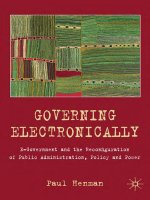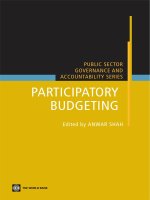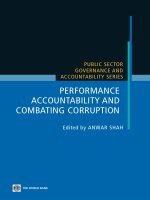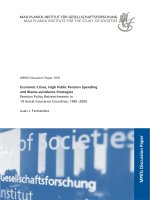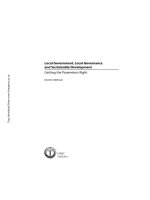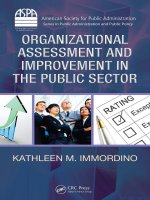PUBLIC SECTOR GOVERNANCE AND ACCOUNTABILITY SERIESPERFORMANCE ACCOUNTABILITY AND COMBATING doc
Bạn đang xem bản rút gọn của tài liệu. Xem và tải ngay bản đầy đủ của tài liệu tại đây (1.82 MB, 450 trang )
PUBLIC SECTOR
GOVERNANCE AND
ACCOUNTABILITY SERIES
PERFORMANCE
ACCOUNTABILITY AND
COMBATING CORRUPTION
Edited by ANWAR SHAHPERFORMANCE
ACCOUNTABILITY AND
COMBATING CORRUPTION
Introduction to the Public Sector Governance and Accountability Series
Anwar Shah, Series Editor
A well-functioning public sector that delivers quality public services consistent with citizen pref-
erences and that fosters private market-led growth while managing fiscal resources prudently is
considered critical to the World Bank’s mission of poverty alleviation and the achievement of
the Millennium Development Goals. This important new series aims to advance those objec-
tives by disseminating conceptual guidance and lessons from practices and by facilitating
learning from each others’ experiences on ideas and practices that promote responsive (by
matching public services with citizens’preferences), responsible (through efficiency and equity
in service provision without undue fiscal and social risk), and accountable (to citizens for all
actions) public governance in developing countries.
This series represents a response to several independent evaluations in recent years that
have argued that development practitioners and policy makers dealing with public sector
reforms in developing countries and, indeed, anyone with a concern for effective public gov-
ernance could benefit from a synthesis of newer perspectives on public sector reforms. This
series distills current wisdom and presents tools of analysis for improving the efficiency,
equity,and efficacy of the public sector. Leading public policy experts and practitioners have
contributed to this series.
The first 14 volumes in this series, listed below, are concerned with public sector
accountability for prudent fiscal management; efficiency, equity, and integrity in public service
provision; safeguards for the protection of the poor, women, minorities, and other dis-
advantaged groups; ways of strengthening institutional arrangements for voice, choice, and
exit; means of ensuring public financial accountability for integrity and results; methods of
evaluating public sector programs, fiscal federalism, and local finances; international practices
in local governance; and a framework for responsive and accountable governance.
Fiscal Management
Public Services Delivery
Public Expenditure Analysis
Local Governance in Industrial Countries
Local Governance in Developing
Countries
Intergovernmental Fiscal Transfers:
Principles and Practice
Participatory Budgeting
Budgeting and Budgetary Institutions
Local Budgeting
Local Public Financial Management
Performance Accountability and
Combating Corruption
Tools for Public Sector Evaluations
Macrofederalism and Local Finances
Citizen-Centered Governance
PUBLIC SECTOR
GOVERNANCE AND
ACCOUNTABILITY SERIES
PERFORMANCE
ACCOUNTABILITY AND
COMBATING CORRUPTION
Edited by ANWAR SHAH
THE WORLD BANK
Washington, D.C.
©2007 The International Bank for Reconstruction and Development / The World Bank
1818 H Street, NW
Washington, DC 20433
Telephone: 202-473-1000
Internet: www.worldbank.org
E-mail:
All rights reserved
1 2 3 4 10 09 08 07
This volume is a product of the staff of the International Bank for Reconstruction and
Development / The World Bank. The findings, interpretations,and conclusions expressed
in this volume do not necessarily reflect the views of the Executive Directors of The World
Bank or the governments they represent.
The World Bank does not guarantee the accuracy of the data included in this work.
The boundaries, colors, denominations, and other information shown on any map in this
work do not imply any judgement on the part of The World Bank concerning the legal
status of any territory or the endorsement or acceptance of such boundaries.
Rights and Permissions
The material in this publication is copyrighted. Copying and/or transmitting portions or all
of this work without permission may be a violation of applicable law. The International
Bank for Reconstruction and Development / The World Bank encourages dissemination
of its work and will normally grant permission to reproduce portions of the work promptly.
For permission to photocopy or reprint any part of this work, please send a request
with complete information to the Copyright Clearance Center Inc.,222 Rosewood Drive,
Danvers, MA 01923, USA; telephone: 978-750-8400; fax: 978-750-4470; Internet:
www.copyright.com.
All other queries on rights and licenses, including subsidiary rights, should be
addressed to the Office of the Publisher, The World Bank, 1818 H Street, NW, Washing-
ton, DC 20433, USA; fax: 202-522-2422; e-mail:
ISBN-10: 0-8213-6941-5
ISBN-13: 978-0-8213-6941-8
eISBN-10: 0-8213-6942-3
eISBN-13: 978-0-8213-6942-5
DOI: 10.1596/978-0-8213-6941-8
Library of Congress Cataloging-in-Publication Data
Performance accountability and combating corruption / edited by Anwar Shah.
p. cm.
ISBN-13: 978-0-8213-6941-8
ISBN-10: 0-8213-6941-5
ISBN-10: 0-8213-6942-3 (electronic)
1. Total quality management in government. 2. Political corruption—Prevention.
I. Shah, Anwar.
JF1525.T67P43 2007
352.3'4–dc22
2006101263
v
Contents
Foreword xv
Preface xvii
Acknowledgments xix
Contributors xxi
Abbreviations and Acronyms xxv
Overview 1
Anwar Shah
Part I Ensuring Integrity and
Improving the Efficiency of
Public Management
Performance-Based Accountability 15
B. Guy Peters
Central Place of Accountability in Governing 15
The Shift to Performance-Based Accountability 19
A Strategy for Change 21
1
CHAPTER
Barriers and Perverse Consequences 27
Conclusions 30
Notes 31
References 31
Efficiency, Integrity, and Capacity: An Expanded Agenda
for Public Management?
33
Willy McCourt
Generating Commitment to Public Management Reform 34
Creating the Conditions for Public Management Reform 40
How Should Reforms Be Introduced and Sequenced? 52
Conclusion: Embedding Reforms 55
Notes 55
References 55
Can E-Government Make Public Governance
More Accountable?
59
Helmut Drüke
Accountability in Public Governance 60
E-Government as a Comprehensive Concept of
Modernization 62
Fostering E-Government and Accountability 78
Conclusions 81
Notes 84
References 84
Networks and Collaborative Solutions to
Performance Measurement and Improvement in
Sub-Saharan Africa
89
Mark A. Glaser
The Need for a Systems Approach to Community
Improvement 90
From Government to Governance: Networks and
Collaborative Solutions 107
Goals and Performance Targets 113
Performance-Based Budgeting 116
Tools for Engaging Citizens and Respecting Public Values 122
vi Contents
4
2
3
Improving Government Performance in Sub-Saharan
Africa 124
Redefining Performance through Collaborative Networks 125
Notes 127
References 127
Part II Strengthening Oversight and
Combating Corruption
The Role of Political Institutions in Promoting
Accountability
135
Rob Jenkins
Key Concepts in Accountability Systems 136
Institutions: Functions, Pitfalls, and Innovative Remedies 148
Key Trends Affecting Efforts to Improve Accountability
Systems 170
Diagnosing Accountability Failures in Political Institutions 176
Notes 179
References 179
Legal and Institutional Frameworks Supporting
Accountability in Budgeting and Service
Delivery Performance
183
Malcolm Russell-Einhorn
The Importance of Effective Citizen Voice to Budgeting and
Service Delivery Performance 185
Cross-Country Experience with Legal and Institutional
Frameworks That Support Citizen Voice Mechanisms 188
What Kinds of Mechanisms and Conditions Create Effective
Citizen Voice? 205
Case Studies on Strengthening Citizen Voice Mechanisms to
Improve Service Delivery 212
Conclusions 224
Annex: The ARVIN Framework 225
Notes 227
References 229
Contents vii
5
6
Tailoring the Fight against Corruption to Country
Circumstances
233
Anwar Shah
What Is Corruption? 234
What Drives Corruption? 236
What Can Policy Makers Do to Combat Corruption? 243
Conclusions: Don’t Use the “C”Word 249
Notes 250
References 250
Disrupting Corruption 255
Omar Azfar
Dealing with Incidental Corruption: Principal-Agent Theory
versus the Economics of Crime 256
The Sale of Jobs and Its Effect on Mechanisms of
Accountability 258
Dealing with Systemic Corruption 260
Case Study Evidence on Systemic Corruption 272
Elections and Revolutions 276
Recommendations 277
Notes 281
References 282
Corruption in Tax Administration 285
Mahesh C. Purohit
Causes of Corruption in Tax Administration 286
Administering Tax Policy 288
Impact of Corruption 290
Combating Corruption in Tax Administration 292
Conclusions and Policy Recommendations 298
Notes 300
References 301
viii Contents
7
8
9
Corruption and Fraud Detection by Supreme Audit
Institutions
303
Kenneth M. Dye
The Rise in Fraud and Corruption 303
The Need for a Change in Audit Emphasis 305
What Are Fraud and Corruption? 307
The International Organization of Supreme Audit Institutions’
Interest in Fraud and Corruption 309
Anticorruption Policies 310
Types of Audits 311
Detecting Fraud 314
Reporting Fraud and Communicating with Management 320
Recommendations for Improving SAI Anticorruption
Performance 320
References 321
Public Sector Performance Auditing in Developing
Countries
323
Colleen G. Waring and Stephen L. Morgan
Elements of a Performance Audit 324
Conducting the Performance Audit 333
Conducting Performance Audits in Sub-Saharan Africa 349
Notes 356
References 357
The Growth of Parliamentary Budget Offices 359
John K. Johnson and F. Rick Stapenhurst
The Role of Legislatures in the Budget Process 360
Examples of Specialized Legislative Budget Offices 361
Potential Value and Functions of Independent Budget
Offices 371
Why Is the Number of Independent Budgeting Offices
Growing? 372
Contents ix
10
11
12
Considerations in Establishing Effective Legislative Budget
Units 373
Conclusion 376
Notes 376
References 377
Strengthening Public Accounts Committees by Targeting
Regional and Country-Specific Weaknesses
379
Riccardo Pelizzo and F. Rick Stapenhurst
Legislatures and Public Financial Accountability 380
Organization of PACs across the Commonwealth 381
What Factors Contribute to the Success of a PAC? 383
Obstacles to Effective Performance and Possible Ways of
Overcoming Them 391
Notes 392
References 393
Index 395
BOXES
2.1 The Four Phases of Civil Service Reform in Sri Lanka 35
3.1 Using E-Government to Fight Corruption around the World 71
5.1 Citizen Efforts to Improve the Electoral Process in Argentina
and the United States 152
5.2 Civil Society Achievements in Mexico, South Africa,
and Zambia 156
5.3 Does Participatory Budgeting Increase Accountability
in Brazil? 157
5.4 Political Interference in Prosecuting Corruption
in Malawi 162
6.1 Local Government Participation under the Uruguay National
Agreement of 1992 198
6.2 The Everyday Effectiveness of the Peruvian Ombudsman 200
6.3 Goa’s Right to Information Act 202
6.4 Promise and Pitfalls of Noninstitutionalized Participation:
Mumbai’s Action Committee for Rationing 204
8.1 Experimental Evidence on Controlling Corruption 259
13
x Contents
8.2 Fighting Corruption Indirectly in Indonesia 265
9.1 Causes of Corruption in Tax Administration
in Bulgaria 286
9.2 The Nature of Tax Fraud in India 289
9.3 Using Information Technology to Streamline Services and
Reduce Corruption in India 295
9.4 Using an Independent Agency to Combat Corruption 296
10.1 The Risks of Whistle-Blowing 318
11.1 Does the Drug Abuse Resistance Education (DARE)
Program Work? 332
11.2 Conducting a Performance Audit of Child Immunization
Services at the Local Level 335
11.3 Cost of Child Immunization Services Clinic Staff: Site Visit
Fieldwork Plan 345
FIGURES
6.1 Six Dimensions of Background Constraints 194
6.2 Voice Expression and Accountability Effects 206
6.3 Key Functional Institutions Necessary for Effective Stakeholder
Participation/Consultation 209
11.1 Government Program Elements and Performance Aspects
Subject to Audit 328
11.2 Interaction among Elements of an Audit Finding 348
TABLES
2.1 Application of Political Model of Reform to Civil Service
Reform in Sri Lanka 37
2.2 Forces Driving and Restraining Civil Service Reform
in Morocco 38
2.3 Responsibility for Staff Management in Central Government
Agencies (Commonwealth Structure) 43
2.4 Sequencing of Public Management Reforms 53
3.1 Dimensions of Good Governance 63
3.2 Characteristics of Countries with “Restricted Stateness” 67
3.3 Ways in Which E-Government Contributes to
Good Governance 69
4.1 Output Reporting by the Fairfax County Police Department 97
4.2 Output Reporting by the Fairfax County Fire and
Rescue Department 98
Contents xi
4.3 Output Reporting by the Fairfax County Park Authority 99
4.4 Output Reporting by the Fairfax County Community and
Recreation Services Cost Center 100
4.5 Output Reporting on Fairfax County Integrated Services
Community Initiatives 108
6.1 Key Laws, Policies, and Institutions Supporting
Voice Mechanisms 189
6A.1 The ARVIN Framework: A Way to Assess the Enabling
Environment for Civic Engagement 225
7.1 Priorities for Anticorruption Reforms Given Level of
Corruption and Quality of Governance 243
7.2 Empirical Evidence on Success of Selected
Anticorruption Programs 245
7.3 Relevance of Anticorruption Programs Given Country
Circumstances 247
8.1 Examples of Anticorruption Efforts Suggested by the
Economics of Crime and by Principal-Agent Theory 257
8.2 Alternatives to Traditional Mechanisms of Accountability in
Countries with Systemic Corruption 262
8.3 Rules That Might Have Prevented Democracy from Being
Subverted in Belarus 274
11.1 Types and Examples of Audit Findings 327
11.2 Pre-audit Information-Gathering Activities and
Their Benefits 336
11.3 Vulnerability Assessment of Risks Facing Child Immunization
Services 338
11.4 Performance Objectives Based on Assessed Risks of Child
Immunization Program 340
11.5 Methodologies for Gathering and Analyzing Data 341
11.6 Finding Elements, Data, and Analysis Methods Needed to
Conduct Performance Audit of Child Immunization
Program 343
11.7 Caveats about Conducting a Performance Audit 351
12.1 Characteristics of Selected Independent Budget Offices 375
13.1 Percentage of PAC Chairs Who Report that PAC “Frequently”
Achieved Various Results, by Region 384
13.2 Percentage of PAC Chairs Who Consider Various Formal
Factors “Very Important” to PAC Success, by Region 385
xii Contents
13.3 Percentage of PAC Chairs Who Consider Alternative
Compositional Factors “Very Important” to PAC Success,
by Region 388
13.4 Percentage of PAC Chairs Who Consider Various Practices
and Procedures “Very Important” to PAC Success,
by Region 389
Contents xiii
Foreword
In Western democracies, systems of checks and balances built into
government structures have formed the core of good governance
and have helped empower citizens for more than two hundred years.
The incentives that motivate public servants and policy makers—
the rewards and sanctions linked to results that help shape public
sector performance—are rooted in a country’s accountability
frameworks. Sound public sector management and government
spending help determine the course of economic development and
social equity, especially for the poor and other disadvantaged
groups, such as women and the elderly.
Many developing countries, however, continue to suffer from
unsatisfactory and often dysfunctional governance systems that
include rent seeking and malfeasance, inappropriate allocation of
resources, inefficient revenue systems, and weak delivery of vital
public services.Such poor governance leads to unwelcome outcomes
for access to public services by the poor and other disadvantaged
members of society, such as women, children, and minorities.
In dealing with these concerns, the development assistance com-
munity in general and the World Bank in particular are contin-
uously striving to learn lessons from practices around the world to
achieve a better understanding of what works and what does not
work in improving public sector governance, especially with respect
to combating corruption and making services work for poor people.
The Public Sector Governance and Accountability Series
advances our knowledge by providing tools and lessons from practices
in improving efficiency and equity of public services provision and
strengthening institutions of accountability in governance. The series
highlights frameworks to create incentive environments and pressures for
good governance from within and beyond governments. It outlines institu-
tional mechanisms to empower citizens to demand accountability for results
from their governments. It provides practical guidance on managing for
results and prudent fiscal management. It outlines approaches to dealing
with corruption and malfeasance. It provides conceptual and practical guid-
ance on alternative service delivery frameworks for extending the reach and
access of public services. The series also covers safeguards for the protection
of the poor, women, minorities, and other disadvantaged groups; ways of
strengthening institutional arrangements for voice and exit; methods of
evaluating public sector programs; frameworks for responsive and account-
able governance; and fiscal federalism and local governance.
This series will be of interest to public officials, development practi-
tioners, students of development, and those interested in public governance
in developing countries.
Frannie A. Léautier
Vice President
World Bank Institute
xvi Foreword
xvii
Preface
Performance-based accountability is appealing because of its
potential to improve government service delivery performance and
to ensure the integrity of public operations. But implementation of
such an accountability system represents a major challenge for any
public sector organization; most such reforms fail as a result of dif-
ficulties in design and implementation. This volume provides
advice on how to institutionalize performance-based accountabil-
ity, especially in countries that lack good accountability systems.
The volume describes how institutions of accountability may be
strengthened to combat corruption.
The volume is organized into two parts. The first part deals
with public management reforms to ensure the integrity and
improve the efficiency of government operations. It outlines an
agenda for public management reforms and discusses the roles of
e-government and network solutions in performance improve-
ments. The second part of the volume provides advice on strength-
ening the role of representative institutions, such as organs and
committees of parliament, in providing oversight of government
programs. It also provides guidance on how auditing and related
institutions can be used to detect fraud and corruption. The book
highlights the causes of corruption and the use of both internal and
external accountability institutions and mechanisms to fight it. It
provides advice on how to tailor anticorruption programs to indi-
vidual country circumstances and how to sequence reform efforts
to ensure sustainability.
This volume is the outcome of a partnership between the
Swedish International Development Agency and the World Bank
Institute through the Public Expenditure Management and Financial
Accountability (PEFA) program. It is hoped that the ideas for reform
presented here will aid these institutions’ client countries.
Roumeen Islam
Manager, Poverty Reduction and Economic Management
World Bank Institute
xviii Preface
xix
Acknowledgments
This book brings together learning modules on government
performance accountability and combating corruption prepared
for the World Bank Institute learning programs directed by the editor
over the past three years. These learning modules and their publi-
cation in the current volume were primarily financed by the gov-
ernment of Sweden through its Public Expenditure and Financial
Accountability (PEFA) partnership program, sponsored jointly
with the World Bank Institute and directed by the editor. The gov-
ernment of Japan provided additional financial support for the
editing of this volume. The editor is grateful to Hallgerd Dryssen of
the Swedish International Development Agency (SIDA) in Stock-
holm, for overall guidance and support of the PEFA program. In
addition, Bengt Anderson, Goran Anderson, Gunilla Bruun, Alan
Gustafsson, and other members of the external advisory group for
PEFA contributed to the design and development of the program.
Thanks are also due to Cecilia Nordin Van Gansberghe for her con-
tributions as a SIDA secondee to the PEFA program at the World
Bank Institute.
The book has benefited from contributions to World Bank
Institute learning events by senior policy makers and scholars from
Africa and elsewhere. In particular,thanks are due to Ismail Momo-
niat, deputy director-general (acting) of the National Treasury of
South Africa; Neil Cole, National Treasury of South Africa; Paul
Boothe, former associate deputy minister of the Ministry of
Finance of Canada; Tania Ajam, director of AFReC (the Applied
Fiscal Research Centre of South Africa); Christina Nomdo of IDASA
(the Institute for Democracy in South Africa); Anders Haglund,
PricewaterhouseCoopers, Stockholm; and Florence Kuteesa, public finance
consultant, Ministry of Finance, Uganda.
The editor is grateful to the leading scholars who contributed chapters
and to the distinguished reviewers who provided comments. Alta Fölscher,
Adrian Shall, and Chunli Shen helped during various stages of the prepara-
tion of this book and provided comments and editorial revisions of indi-
vidual chapters. Kaitlin Tierney provided excellent administrative support
for this project.
I am grateful to Stephen McGroarty for ensuring a fast-track process for
publication of this book. The quality of the book was enhanced by excellent
editorial inputs provided by Barbara Karni. Production—including editing,
typesetting, proofreading,indexing, and design—was managed by Janet Sasser.
Denise Bergeron is to be thanked for the excellent print quality of the book.
xx Acknowledgments
xxi
Contributors
OMAR AZFAR is associate professor of economics in the department of
public management at the John Jay College of Criminal Justice of the
City University of New York.An expert on corruption, decentraliza-
tion, and other aspects of governance,he regularly gives advice to the
World Bank, the U.S. Agency for International Development
(USAID), and other development agencies. He is the coeditor with
Charles Cadwell of Market-Augmenting Government: The Institu-
tional Foundations for Prosperity (University of Michigan Press,
2003), which suggests that markets work best when governments
provide an effective legal infrastructure that allows exchange to be
voluntary and reliable.
HELMUT DRÜKE is the head of e-government studies at the Institute of
Electronic Business in Berlin, Germany. He is also assistant profes-
sor of political science at the Institute for Political Science at the
University of Leipzig.He was part of the project team that supported
the Federal Ministry for Economy and Technology in providing
e-government at the local level in Germany. He is the editor of Local
Electronic Government: A Comparative Analysis, with 50 case studies
in seven countries.
KENNETH M. DYE is a chartered accountant with wide experience in
the public and private sectors as an auditor, accountant, and senior
executive. He is currently an independent international develop-
ment consultant serving supreme audit institutions around the
globe. He served as Auditor General of Canada from 1981 to 1991.
He was the founder and first chair of the Development Initiative of
the International Organization of Supreme Audit Institutions
(INTOSAI) and the Public Sector Committee of the International Federation
of Accountants. He directed the Cowater Accountability Group from 1993 to
2003, where he specialized in strengthening of supreme audit institutions and
ministries of finance in developing countries.
MARK A. GLASER is a professor of public administration at the Hugo Wall
School of Urban and Public Affairs at Wichita State University, in Kansas.
His research focuses on improving performance by strengthening connec-
tions between citizens and local government, particularly through the use of
citizen surveys.
ROB JENKINS is professor of political science at Birkbeck College, University
of London. His research focuses on the politics of development, particularly
politics and political economy in contemporary India. He is the author of
Democratic Politics and Economic Reform in India, the coauthor of Reinvent-
ing Accountability: Making Democracy Work for Human Development,
and the editor of Regional Reflections: Comparing Politics across India’s States.
In addition to articles in academic journals, his work has appeared in the
Guardian, the Wall Street Journal, and Dissent. He has worked as a consult-
ant for the United Nations Development Programme, the U.K. Department
of International Development, and other agencies.
JOHN K. JOHNSON is director of development for the Center for Legislative
Development at the University at Albany, State University of New York. He
has designed or managed democracy development activities for a variety of
national and international organizations, including USAID, the United
Nations Development Programme, the World Bank Institute, the Inter-
American Development Bank, and the Ford Foundation. A former Foreign
Service officer in Latin America, a USAID parliamentary project manager, a
teacher in Kenya,and a committee director in the New York State Legislature,
Mr. Johnson has management, consulting, and training experience in more
than 25 countries.
WILLY MCCOURT is a senior lecturer at the Institute for Development Policy
and Management at the University of Manchester. He has published on
development policy, human resource management,and public management
in developing countries.
STEPHEN L. MORGAN is the city auditor of Austin, Texas, where he directs a full
scope audit office that conducts performance audits, investigates fraud, and
xxii Contributors
engages in consulting. Before joining the City Auditor’s Office, Mr. Morgan
was an auditor in the U.S. Government Accountability Office’s National Pro-
ductivity Group, where he was responsible for auditing federal productivity
programs. In 2002 he received the Harry Hatry Distinguished Performance
Measurement Practice Award from the American Society of Public Admin-
istration, honoring his lifetime of contributions to public service.
RICCARDO PELIZZO is assistant professor of political science at the Singapore
Management University and a World Bank consultant on legislative issues.
He is the coauthor, with Gianfranco Pasquino, of Parlamenti Democratici.
B. GUY PETERS is the Maurice Falk Professor of Government at the University
of Pittsburgh, as well as an adjunct professor at Bodo University College
(Norway) and the City University of Hong Kong. Among his recent publi-
cations are The Handbook of Public Administration and The Handbook of
Public Policy, both coedited with Jon Pierre, and Institutional Theory in Polit-
ical Science (2nd ed).
MAHESH C. PUROHIT is director of the Foundation for Public Economics and
Policy Research.Prior to this,he was a professor at the National Institute of Pub-
lic Finance, New Delhi. He served as Member-Secretary of the Empowered
Committee of State Finance Ministers to Monitor Sales Tax Reforms
(1999–2001),Secretary to the Committee of Chief Ministers on VAT and Incen-
tives to Backward Areas (1999),Member-Secretary to the Committee of Finance
Secretaries on Backward Area Incentives (1999), and Secretary to the Commit-
tee of State Finance Ministers (1998). He is the author of many books and
articles on public finance, industrial economics,and environmental protection.
MALCOLM RUSSELL-EINHORN is associate director of the IRIS Center at the
University of Maryland, where he directs projects and conducts research on
demand-driven strategies for improved delivery of government services. A
lawyer and governance specialist who has worked on regulatory reform,
administrative reform, and anticorruption projects around the world,
Mr. Russell-Einhorn has written articles on comparative administrative law,
government transparency, and legal reform. He has taught courses on law
and development and comparative law at the law schools of Boston College,
Boston University, Georgetown University, and American University.
ANWAR SHAH is lead economist and program leader for public sector gover-
nance at the World Bank Institute,Washington, D.C. He is also a member of
Contributors xxiii



